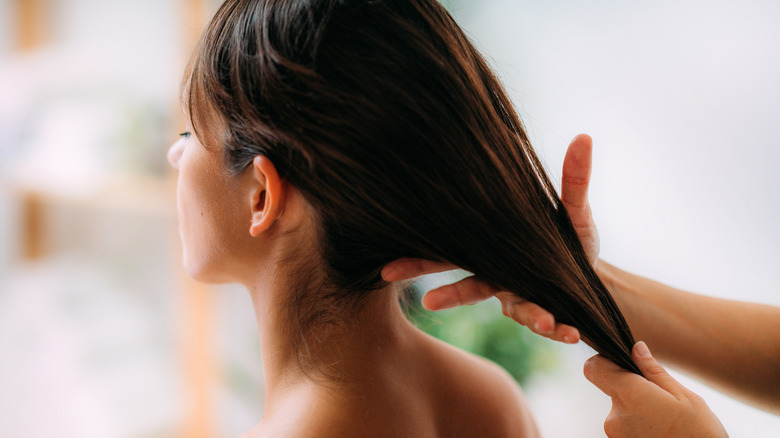Traditional Hair Oiling Is More Than Just A Treatment – It's A Deeply Personal Self-Care Practice
If you search #hairoiling on TikTok, you'll find hundreds of women of different cultural backgrounds sharing how-tos and before-and-afters of applying oil to their hair. While many South Asian women have grown up with this beauty practice, those outside the culture may be unaware of the deep historical and cultural origins of hair oiling. For Indian women, hair oiling is more than just a trendy beauty hack to soften their hair.
Hair oiling is a cultural and holistic lifestyle practice that evokes family traditions and childhood memories for many South Asian women. Siblings Akash and Nikita Mehta, co-founders of beauty brand Fable & Mane told Glamour UK, "During a time of hair loss and stress, we were reminded of the power of the Indian tradition of hair oiling and recalled a time when our grandmother would come from India and massage our head and hair with handcrafted blends of plant oils." Although Ayurvedic oils can help with hair loss — which can be particularly distressing for women – while participating in hair oiling, it would serve us best to understand its origins and cherish it for the incredible cultural and wellness practice it is.
Hair oiling has deep roots in Indian culture but has become a beauty trend for Westerners
Indian hair oiling has its roots in Ayurveda – an ancient and holistic approach to medicine that has been practiced in India for thousands of years. According to the principles of Ayurveda, one can maintain good health and prevent illness by balancing the body and mind through proper diet, lifestyle, and herbal remedies (many hair oils are plant-derived). Westerners have adopted the ancient Indian practice of hair oiling as a vital part of their beauty routine, and it's easy to see why: hair oil can help with frizziness, thinning hair, dry hair and scalp, and hair breakage.
But some TikTok users have pointed out the stigma attached to hair oiling, particularly that it may not have always been embraced by Western culture. TikToker @himynameispriya remembers being teased as a kid for having oil in her hair, to which some users responded in solidarity saying, "This hair oil represents us brown girls," and "Every brown household has this hair oil." Kids certainly can be mean, and ignorance is often the cause, as another user pointed out, "I think the issue [is] kids are never taught about any other culture except their own. As a kid I never knew about hair oiling and just assumed." Even as children, we can internalize ethnocentric beliefs — understanding and evaluating other cultures as inferior to our own — which contributes to this denigration of non-Western practices.
When does adopting other cultures' practices cross the line into cultural appropriation?
If you're going to adopt cultural wellness practices like hair oiling into your beauty routine, it's important to understand and appreciate its origins. Otherwise, your lack of sensitivity may come off as cultural appropriation – inappropriately or disrespectfully adopting another culture's practices, ideas, beliefs, or appearances. One TikTok user called out a non-Indian woman — who posted a hair oil tutorial in which she mispronounced the name of the oil and said it had a bad smell — and said, "...let's start gatekeeping [S]outh Asian practices..." Responses to this were varied, with some in agreement saying, "Did all that research on it and she couldn't even research how to say it."
Others, however, didn't see a problem saying, "...people pronounce things depending on where they're from and also smell is an opinion." Indeed, this battle of opinions evokes a broader question: where is the line between cultural appreciation and appropriation? And is cultural gatekeeping — protecting your own cultural beliefs and practices from being appropriated by outsiders — necessary or harmful? As The Medium points out, intentionally deriding cultural practices or beliefs different than your own is never okay — but gatekeeping to the extent that prevents people from wanting to learn about other cultures isn't ideal either. Instead, we should take the time to understand and appreciate a cultural practice like hair oiling by learning the historical and familial significance to South Asian women.
